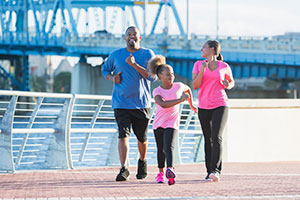Exercise Can Help Improve ADHD Symptoms This Summer

“With physical activity, executive function performance improves in as little as 20 minutes, and ADHD symptoms can reduce in intensity in as little as 30 minutes of exercise,” says author Stephanie Sarkis, PhD, a clinical specialist in child and adolescent counseling.
Research shows that physical activity and movement help to increase attention, decision making and learning.
Jeffrey Halperin, PhD, has been studying the effects of exercise and play-based interventions on children with ADHD. He is a distinguished professor of Psychology at Queens College of the City University of New York and is a former member of the CHADD Professional Advisory Board.
“We know that moving and activity enhances brain function,” he says. “Exercise—in particular, rigorous exercise has been shown to affect a wide array of neurological processes. These kinds of activities enhance brain development and brain growth. The literature…shows that physical exercise increases all aspects of brain development.”
Summer is a great time for outdoor exercise
Dr. Halperin says there needs to be a certain degree of structured and organized play.
“It can’t just be running around willy-nilly, and certainly it’s better if there is some directedness to it,” he says, recognizing the need for structure in many children with ADHD. “The degree to which children can use their own creativity and internal directions to help them out with play is great, but having parents involved and directing them in some way is good and will vary as a function of the children’s ages.”
Parents can offer some direction by making physical activities a family event. Go roller- or in-line skating with your children, sign children up for swim or tennis lessons, or make sure little ones have jump ropes and hula hoops, basketballs, or even old-fashioned croquet sets to help them get active. Softball, volleyball, and kickball are all backyard favorites.
Taking walks with your children is just as important. In addition to the physical benefits of walking around the block or the local track, taking the time to visit with your children while walking can help improve your relationship, which can often be strained by the challenges of ADHD.
Play also helps coordination
Dr. Halperin and his colleagues have been researching how physically active games benefit children with ADHD. These games teach children impulse control, motor skills, memory, perceptual ability, and physical activity.
“These play-based or exercise-based interventions are not going to be an acute treatment, like stimulant medication for ADHD," he explains.
“They’re not going to suddenly take away all the symptoms,” Dr. Halperin says, noting that they may influence the trajectory of the condition and “promote better long term outcomes for children.”
Other Articles in this Edition
Exercise Can Help Improve ADHD Symptoms This Summer
